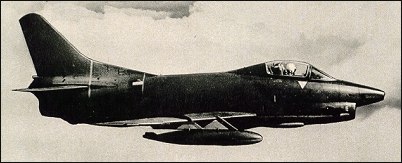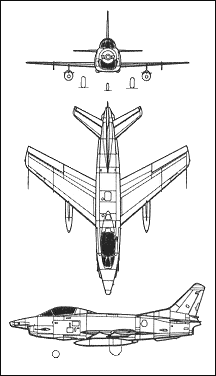|
| The original single Bristol Siddeley Orpheus-engined Fiat G91 was designed in accordance with NATO requirements for a standard lightweight tactical strike fighter to equip its forces. The first of three prototypes and 27 pre-production aircraft flew on 9 August 1956. Original production models included the G91R/1 photographic-reconnaissance version (three Vinten 70mm cameras) and similar R/3 and R/4 with armament changes; G91N modified aircraft to evaluate navigational aids; G91T/1 tandem two-seat version for advanced training at tran-sonic speeds, and similar T/3 and T/4 with equipment changes.
The G91Y is a twin-engined development of the G91 based upon the G91T version. Two prototypes were built (the first flying on 27 December 1966) followed by 20 pre-series G91Y for the Italian Air Force. Delivery of the initial series of 35 production aircraft to the Italian Air Force began in September 1971, as single-seat light tactical strike-reconnaissance fighters. Armament comprises two 30mm DEFA cannon and cameras in nose; four underwing attachment points for 450kg bombs, 340kg napalm tanks, 7 X 50mm rocket packs, 28 X 50mm rocket packs or 4 X 127mm rocket containers. G91 are in service with the air forces of the German Federal Republic (G91R/3 and G91T/3 - including R/3 licence-built in Germany), Italy (G91R/1, R/1A, R/1B, G91T/1 and G91Y) and Portugal (G91R/4).
| CREW | 1 |
| ENGINE | 1 x BS "Orpheus 803", 22.3kN |
| WEIGHTS |
| Take-off weight | 5200 kg | 11464 lb |
| Empty weight | 3000 kg | 6614 lb |
| DIMENSIONS |
| Wingspan | 8.6 m | 28 ft 3 in |
| Length | 11.1 m | 36 ft 5 in |
| Height | 4.5 m | 15 ft 9 in |
| Wing area | 16.4 m2 | 176.53 sq ft |
| PERFORMANCE |
| Max. speed | 1020 km/h | 634 mph |
| Cruise speed | 407 km/h | 253 mph |
| Ceiling | 12000 m | 39350 ft |
| Range w/max.fuel | 2300 km | 1429 miles |
| Range w/max payload | 700 km | 435 miles |
| ARMAMENT | 4 x 12.7mm machine-guns or 2 x 30mm cannons |
| e, e-mail, 21.02.2025 20:12 e reply |
| e, e-mail, 21.02.2025 20:09 e reply | | e, e-mail, 21.02.2025 19:55 e reply |
| e, e-mail, 21.02.2025 19:45 e reply | | 0, e-mail, 21.02.2025 19:39 e reply | | e, e-mail, 21.02.2025 19:05 e reply | | e, e-mail, 21.02.2025 19:04 e reply | | 0, e-mail, 21.02.2025 19:01 e reply | | 0, e-mail, 21.02.2025 19:01 e reply | | e, e-mail, 21.02.2025 18:52 e reply | |
| | e, e-mail, 21.02.2025 18:48 e reply | | e, e-mail, 21.02.2025 18:39 e reply | | e, e-mail, 21.02.2025 18:30 e reply | | e, e-mail, 21.02.2025 18:27 e reply | | e, e-mail, 21.02.2025 18:25 e reply |
| e, e-mail, 21.02.2025 18:18 e reply |
|
Do you have any comments?
|
| 
COMPANY
PROFILE
All the World's Rotorcraft
|







 e
e
20
reply